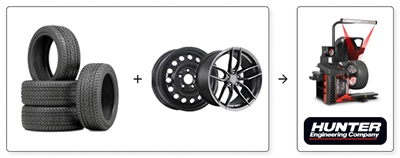Do wheels and tires have an impact on fuel consumption?

The experts at PMCtire.com conduct extensive testing throughout the year to find the best products at the best prices. In addition to looking at performance, safety, comfort and durability, they also focus on fuel efficiency.
Many factors can affect your vehicle's fuel consumption. At first glance, your vehicle's wheels and tires may not have much of an impact on your fuel consumption, but they play an important role in fuel efficiency.
How do tires affect gas mileage?
With prices at the pump rising yearly, drivers are looking for ways to save money on gas. Most people point to the aerodynamics of their vehicle, leaving the engine running too long at a standstill or using the air conditioning too often as the primary source of excessive fuel consumption. But a more effective way to save fuel is to make the right choice when buying your tires! Tires account for more than 20% of your fuel consumption.
Wider tires increase fuel consumption because they are heavier and improve rolling resistance. Rolling resistance requires more effort from the engine to move the vehicle, which requires more fuel. According to several studies, 35% of the fuel is used to counteract rolling resistance. So choosing tires with low rolling resistance saves you money.
Yes, to narrower tires, but make sure to respect the dimensions recommended by the vehicle manufacturer! Often suspensions, brakes, axles, etc., are sized to match the tire size. It is also important to remember that narrower tires have less grip on dry pavement and, therefore, less grip when cornering.
The importance of tire pressure
Tire air pressure is another factor that can affect your vehicle's fuel economy. If your tires have low air pressure, they offer more resistance. Fortunately, you can quickly solve this problem. If you regularly check the air pressure in your tires, you can make sure you maintain the recommended pressure for optimal performance.
The experts at PMCtire.com advise you not to rely solely on your tire pressure monitoring system, as it usually only alerts you when your tire's air pressure is 25% lower than the manufacturer's recommendation. If you want your vehicle to be as fuel-efficient as possible, make it a habit to check your tire pressure once a month.
It is even more important to check your tire pressure in winter. Tire pressure drops by 1 PSI every time the temperature drops 6°C. If the temperature were 10°C when you put on your winter tires in October, the tire pressure would have dropped 5 PSI when the temperature drops to -20°C!
Does tire tread affect fuel economy?
Tire tread also affects your fuel economy.
There's a reason why race car drivers use treadless tires. They offer less resistance and allow their vehicles to climb to higher speeds more easily. Unlike race car drivers, however, we need the tread on our vehicles to be able to brake quickly in bad weather conditions.
Another consideration is the type of tire. You may increase your fuel consumption if you use wide tires suitable for off-roading but drive mostly on paved roads.
What about the wheels?
Most wheels are steel, but depending on the weight of your vehicle, you may want to consider a light alloy wheel.
This can reduce the weight of your vehicle and therefore minimize the rolling resistance of your vehicle. However, be aware that this can affect the tires you can purchase for your car. If this requires you to buy wider tires, you will lose fuel efficiency.
Some wheels are also more aerodynamic, especially on electric vehicles.
Combining the right tires, wheels, and proper vehicle maintenance can make your car more fuel efficient. This will help you save money on gas and reduce your carbon footprint, which is a win-win situation for you and the environment.


